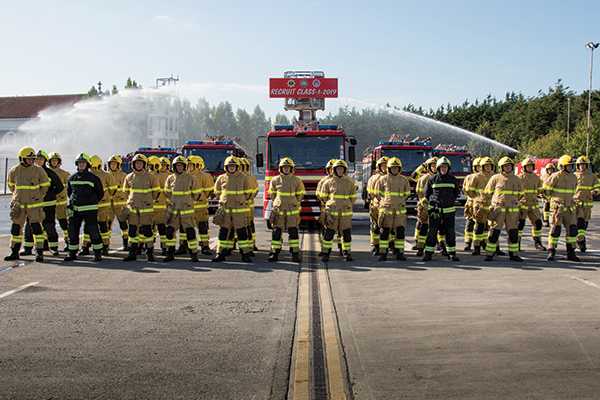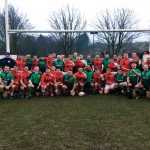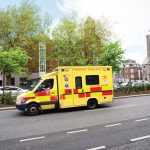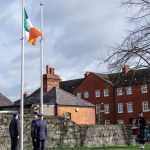In the second part of our series, Adam Hyland returns to Class 1/2019 at the end of their training as they prepare for, and complete their passing out to become professional firefighters.
The OBI was a flurry of activity when I went to visit Recruit Class 1/2019 in September. Now in the midst of their final preparations for pass out the following week, they were being put through their paces on a marching exercise in the drill yard. “They’ll get it right though, because they have to,” Course Director A/D/O Joe Mangan tells me.
A lot has happened since I first met them at the end of July, when they had just completed basic training and moved on to specialist courses. Another gruelling couple of months later, they were almost ready to graduate as professional firefighters, an achievement that comes after months of solid effort and hard work.
Under the guidance of Brigade Training Officer Brendan Carroll and Assistant Brigade Training Officer Frank Kiernan, Course Director A/D/O Mangan, Assistant Course Director Cormac Cahill, six syndicate officers and a large number of specialist instructors, all 36 recruits came through their specialist courses successfully.
“Each course has its own individualities, but overall, the key learning outcomes have been achieved in each course,” A/D/O Mangan tells me, “and each recruit is meeting the same standard. They all had to reach the same competencies, and they have all successfully done that.”
He adds: “As with anything, some sailed through the courses, some needed a little more work, but they all got there. That’s the instructors’ job, to push them and to help them as much as they can. The instructors put a lot of work in, coming in early to set up scenarios, etc, and putting work into individual recruits who need it. The goal is to get them through it, and we did get them through it. Everything is achievable, once you put the work in.”
GETTING TO WORK
This ethos, he says, will carry on into the job, with nine of the recruits going operational shortly after pass out, while others return to the OBI Training Centre to start their paramedic training. Those going operational will return to complete their paramedic training next year after gaining valuable experience on the frontline.
“For the lads going operational, they are going to have to build their experience, build on their training. They are going to gain a lot of experience working as firefighters and using the training they have acquired here,” A/D/O Mangan says.
Those moving on to the paramedic course will go operational just before Christmas. “They have another long journey ahead of them, and a lot of challenges, in regards to studying and applying themselves in a more academic way. A lot of the stuff they have been through at the OBI has been physical, hands on work, but on the paramedic side, there is a lot of knowledge to be learned, so it will be a different format, and a different challenge, for them.”
The recruits from the Louth and Galway Fire Service are preparing to return home and begin their careers as full-time professional firefighters. “It’s an exciting time for them,” A/D/O Mangan tells me. “They were all retained previously, and going full-time is something they have always wanted. They now go in, do their job, and know when they have to be in work, when they have time off… No more having their dinner interrupted by the beeper going off. I’m sure their families will be looking forward to that.”
When first meeting the recruit class, it was interesting to hear their initial impressions and to find out what aspect of training they found toughest, what they were looking forward to, and what they were anxious to get over and done with. With these courses now completed, I ask A/D/O Mangan for his thoughts.
“For most of them, even the thoughts of doing BA was daunting, especially when they heard the war stories from the first group to do it,” he says, “but once they got into doing it, they all seemed to enjoy it, looking back. It’s tough, but every course has its own challenges. Some excel at BA, but might find the pump or SRT hard, it’s all different challenges.”
Getting through training and becoming a firefighter obviously requires discipline, but with the end so close, I wonder how that sense of focus is kept.
“Discipline is key, especially when they go operational, and they know that when they are asked to do something, they do it – that’s how the DFB operate,” A/D/O Mangan tells me. “Having said that, they know that the end is in sight now, so they are a bit more relaxed on the drill yard. But once they are in prep mode, they switch on again and are focused.
“When they finished their specialty courses, we got them all back for basic training, hose rolling, ladders, etc, to make sure they knew it was time to switch back on. Once we were happy with their standard again, we decided they could start on pass out prep. It’s their day, a big occasion for them and their families who will be there to support them, so we are saying we will get you there, but you need to put the work in first.”
Preparing for pass out means perfecting drills to be performed on the day. “It’s just practice, practice, practice to get it all ready,” A/D/O Mangan says. “The training they have been doing all along means that they are ready to step into these exercises without any difficulty. Once we give them a role, they perform that, and have ample time to practice it. They are almost fully-qualified firefighters now, so there should be no problems for them.”
What advice would you give Class 1/2019 as they move on to the next phase of their careers? I ask.
“Never forget their training,” A/D/O Mangan says. “Remember that every day in the DFB is a learning day, every incident they go to, they are going to learn something new, and they need to learn from the experience of other firefighters. As much as we can teach them in the Training Centre, nothing will compare to the experience when they go operational, and that is what they have to learn, to build on that experience.
“They are going to have to deal with certain experiences, and that’s where senior firefighters will look after them. But also enjoy it. You should be looking forward to going into work every day, and I think everyone in the DFB does. Just enjoy it. I would like to personally wish them all the best in their careers, to have a happy and safe career.”
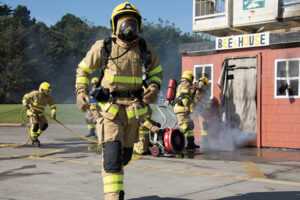
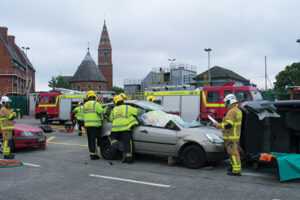
THE RECRUITS
Darren Donnelly had completed the RTC course and had just started the BA course when I first spoke to him in July. For him, each course was tough but ultimately rewarding. “BA was the hardest,” he says, “but one of the more enjoyable ones. It was great to be getting involved in what we would actually be doing a lot. Then when we got to the SRT course, that was great. We went to Lara and then Wren’s Nest in Lucan, great fun, a great course. It was good to be getting into the water because I love swimming. That was the best course for me, but as regards best memories, well there were a couple of moments in the BA course. But it was great all round.”
He is looking forward to pass out. “To pass out will mean the world to me. It’s been a long process since I applied for the job, that was three years ago. To say I am nearly finished now is unreal.”
After that, it’s a return to the OBI. “It’s pass out next week, and then straight into paramedic training the following week. There’s a lot to learn, so I will be hitting the books, working hard. That will be three months, so I will finish just in time to go operational by Christmas.”
“Right now, we are just flapping to get the pass out parade prep done, so the minds are all focused on that,” Keith Russell tells me. “We are getting there. There’s a lot to do for each individual group. The foot drill is going… well, it’s going. We just need to stay tuned in. The displays are in some regards easier because we are in a collective group and you can give each other a hand and help if they are doing something wrong, but with the foot drill, every individual needs to stay tuned in. By pass out it will be polished.
“My family will be coming up for the pass out. It’s something very special for the families, but it also lets them see the results of the hard work we have done. They can now say: ‘Oh that’s what you were at for the last 14 weeks.’
“It will be nice for the family to see the Training Centre too, because up to now I have been talking about the OBI, and they have said to me I may as well be talking to the man in the moon.” He continues: “To pass out will be great, to get through the DFB training and start the job. There’s a lot of work in it, you can’t take your foot off the pedal, some of it a challenge, some of it enjoyable.”
Keith had completed the EFR and pump courses, and had just started RTC when we first spoke. He too found the remaining courses tough but rewarding.
“I think each of the specials had their own challenges,” he tells me. “I would have had BA experience from my retained job (in Navan), but there was always something new to learn, and a new challenge for everybody. None of us thought we were out for a walk in the park. It was a matter of getting through them.
“For me, the EFR was great. The paramedic instructors we had were excellent and it was really good to gain the experience from them, and they encouraged us to get stuck in.”
He recollects on some elements of each course. “The sewer crawl was interesting, I have to say. It was cold and… interesting. Something I had never experienced before, it was tough, but it was enjoyable too. The compartment fire training, I thought how it was done was brilliant, the instructors were great. And the positive pressure ventilation was something I had only read about, but to be hands on and see the workings of it was brilliant, and I am looking forward to using it in the job.
“There’s been ups and downs, but I enjoyed most of it. BA and RTC stood out for me. There was so much to learn. Hazmat was enjoyable too. How the instructors did it made it really good. It was tough and physical, but there wasn’t one course I absolutely hated. It was all about staying focused and getting through it.”
Keith is one of the nine recruits going operational. “I am a little bit wary that I am going into the job without the paramedic training done yet,” he admits, “so I think I’ll be bringing in the box of biscuits to apologise. But I am looking forward to actually going operational.
“I am looking forward to working hands on with experienced firefighters and paramedics in real situations, and it’s an opportunity for me to learn and prepare me well for when I come back in to do the paramedic training. It’s been a long trek, but it’s been a great experience, and a good few friendships have been made along the way.”
Ross Bell had also completed the pump and EFR courses and had started on RTC when we first met. He is returning to Carlingford to take up a position as a full-time firefighter with Louth Fire Service after working as a retained firefighter for many years, and found the rest of training to be invaluable.
“It was brilliant,” he tells me. “We were pretty flat out with the specialty courses – SRT, two weeks RTC and three weeks of BA back to back, so we were flat to the mat. It was very good to get through the BA because there was no time for contemplation, you know when you get into work that you will be thrown in the deep end. The SRT was great too – it was full-on, but it is important to be able to know what you might be faced with.”
He too is in full on pass out prep mode when we speak. “Apart from a lot of polishing of the shoes, it’s grand – everybody is looking forward to it,” he tells me. “The wife and children will be coming up, and that is great, because they will get to see what I have been doing for the last three months. I don’t think people, even your family, know exactly what it is we are doing. This will give them an idea, after the late nights coming home tired, this shows them what we have been up to. It was hard to come home late, very tired, getting your dinner at 9pm, but at least now we can show that all the hard work was worth it. It’s three months flat out, but overall it gets you ready for the job.”
For him, turning professional will bring positive changes to his family life. “Going full-time will bring some normality to life,” he says. “Back home, I was five days a week, 24 hours a day on call, restricted in where you could live because you need to be within minutes of the station, and I was doing that for 12 years. Now as a full-time firefighter, it will be a nice change to be able to know what my week is like. There is more of a structure to it, and then to family life as a result.”
Michael Kiernan tells me that pass out prep is hectic. “There’s a lot going on but everybody is very clear in what they have to do now. Everybody is just hoping we can get it all together for when we have to do it in front of the families.”
For him, passing out will bring a great sense of pride. “This will be the toughest thing I have ever done, but also the thing I will get the most satisfaction out of when we pass out. I am looking forward to the day, and to sharing it with my family.”
Michael had just completed the BA course when we first spoke, and looks back on it and other courses as difficult but enjoyable. “The toughest part of the training was BA, without a doubt, both physically and mentally. The course I enjoyed the most was the RTC course, from a personal point of view. I don’t know why I enjoyed the RTC so much, I just found myself enjoying being on the tools, getting hands on. Plus, from my time in the Control Room, I saw that the RTC call outs are the most common ones the DFB get, they are day in, day out. So, I found it interesting to see what is involved. I also enjoyed learning about the different parts of the car and the tools, it was all new to me, but I felt the courses, especially the RTC course, really enhanced my practical skills.
“It has been a very tough summer,” he adds. “I learned a lot of things. I enjoyed it in the main, and I would have to say I am glad it’s over, but in the positive sense, it’s a great sense of achievement and satisfaction. For me, it’s on to the paramedic course now, which will be another challenge, so there’s no rest for the wicked. After that, it’s into the job itself, just before Christmas, so it will be a busy end to the year. But it is what it is, it’s always busy!”
Domhnall Mac Donnacha is returning to Galway to become a full-time firefighter in the city after pass out, having been retained for several years. “We finish on the Friday and the following Monday I will be doing the aerial platform course for a week before I start the following week on Blue Watch, so there isn’t much of a break,” he tells me.
Pass out prep is going well for him. “It’s good. Myself and two other chippies on the course threw a little house together for the pass out demonstrations, and it’s holding up nicely,” he says. “The marching has to be done too. We were getting a drilling over that, but we will get there. We march almost every day, so we don’t have the excuse. We have been doing it for so long that we know we can pull it together, but at first maybe we are thinking about passing out, rather than where our feet are.
“Looking back over it, I know we will never have this time together as a group again. Even though it has been very tough, there has been a bond within the training, so I am taking the time in this last week to enjoy being around my class mates, because we won’t get all 36 of us together again.”
As with Ross Bell, becoming a full-time firefighter will be what he calls “a life-changer”.
“As a retained firefighter, it really is a full-time job, you are on call 24/7, and to actually have a better standard of life where I can enjoy my four days off and not have to worry about missing a call, so it’s a huge change. You can’t look away from the stability either. I love the job, and can’t see myself anywhere else. I really enjoy it. It means a lot for me to be going into the job.”
His experiences in training were all positive, he says. “It’s a lot of hard work, but the DFB made it easy for me, coming up from Galway. The course was great, I really enjoyed it, all the instructors and D/Os were second to none, they were very obliging. The BA was very good, the Swiftwater was great too – it was nice to get out of the OBI for a day – not that there is anything wrong with the OBI but it was a break, a change of scenery. The instructors were very good, and I enjoyed the water in Lara. The Liffey swim wasn’t as enjoyable, but hopefully I won’t have to get into it again, it will be the Corrib from now on!”
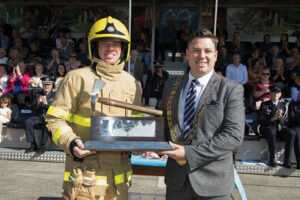
PASS OUT
And so, it was on to the day itself, Wednesday, 18 September, when in glorious sunshine the 36 recruits passed out in front of their family, friends, instructors, DFB Officers and dignitaries, including Dublin Lord Mayor Paul McAuliffe, Galway Mayor Mike Cubbard, and Louth Mayor Fran Treanor. Also there to witness their firefighters graduate were A/C/F/O of Galway Fire Service Michelle Hanly, Louth Fire Service CFO Eamon Woulfe, and representatives of the Northern Ireland Fire Service.
Following a performance by the DB Pipe Band, the recruits marched on to the drill yard before the Lord Mayor gave his address.
“It’s a great honour for me to be here as Lord Mayor of Dublin on what is a fantastic family day,” Mr McAuliffe told the crowd. “The firefighters of Class 1/2019, you and your families will never forget today, you will never forget the achievement that this event underlines. Today is the highlight of three months of hard work for each and every one of you.
“I’m very proud to welcome the new recruits into the Dublin Fire Brigade and I wish you all the very best in your future careers. You now have a proud position to uphold, and I have no doubt that following your training, you will be willing and able to do that. Congratulations to each and every one of you.”
Later in the day, I ask the Lord Mayor about his first experience of a DFB pass out. “There’s a huge tradition within the DFB, and a huge tradition with Dublin City Council. My Aide de Camp stands by me, and Lord Mayors will always stand by the Fire Brigade,” he tells me. “The DFB defend the city, and I will always encourage the City Council to defend the DFB. There are those who believe our fire service is not the future, but it absolutely is the future, and we need to make sure that’s the way it stays.”
A/C/F/O Richard Hedderman also addressed the crowd on behalf of Brigade Training Officer Brendan Carroll. “It is a very big day for Class 1 2019. Sixteen weeks ago, these men arrived here, and now they are ready to pass out as fully-trained firefighters. I would like to thank Training Officer Brendan Carroll, Assistant Training Officer Frank Kiernan, and D/Os Mangan and Cahill, who trained these recruits to the highest standard.
“Every recruit here today will be following in the footsteps of many men and women who have gone before them, and we expect very high standards. When called upon, the support they need will be there for them. All that’s left is to wish every one of you well in the future and within your careers in the DFB, and I have no doubt you will continue to deliver the highest standard to the people of Dublin.”
Following an inspection of the recruits by the three Mayors present and the Officers from Louth and Galway, it was time for the recruits to demonstrate their skills under the blazing sun, with compere D/O Hughy O’Leary as always threading the storyline together as special guests the Bumbleance Bee and Irish Blood Tranfusion Service mascot Blood Drop were rescued from a series of emergency situations.
Both were present on the day for the presentation of a cheque of €6,583, made possible by fundraising efforts by the recruits a few weeks previously.
The foot drill demo was followed by a ladder rescue, RTC, Hazmat and Fire/EMS demo, before it was time to present pass out scrolls to the recruits, and the Silver Axe award for Best Recruit, which went to Derek Baitson.
CELEBRATION
With the formalities over and done with, it was time for Class 1/2019 t to celebrate with each other and their families as they merged onto the drill yard amidst cheers and horns. Each of the recruits I spoke to were delighted with how the day went.
In the middle of the celebrations, Keith Russell tells me: “It’s a great feeling. Looking back, it was October 2015 when I was accepted, it is the best part of four years of work. So, to pass out is fantastic. The weather is great, the sun is shining, everyone is flying, it’s just great!”
Domhnall Mac Donnacha says: “I am happy it’s all done now. Time to celebrate! I’m really happy and can’t wait to get started in Galway now.”
He was greeted by Galway Fire Service A/C/F/O Michelle Hanly, who said: “We are thrilled for him. It’s fantastic for him, and fantastic for us, and I can’t wait to see him up and running in the city. He will fit in well, amongst old colleagues, so it’s just positive for everybody. I’m delighted for him.”
“Today was unreal,” Ross Bell tells me. “It’s a very good feeling to have finished, great to get through this course and return to Louth to work as a full-time firefighter.”
Michael Kiernan tells me: “It was a great day, it all went very well, and it’s a great day for my family as well, we are all very proud. I’m glad it’s over in one way, it was a tough three months, but it was a great experience, and very enjoyable. Today was brilliant!”
“I’m absolutely delighted, over the moon,” Darren Donnelly says. “Everything just went perfectly, and I couldn’t have asked for a better day. The sun was out, so that made it even better. A really great day!”
The celebrations would continue for each member of Class 1/2019, but before long they will be back to work. Whether that is on operations in Dublin, Louth or Galway, or the paramedic course at the Training Centre, I wish them many congratulations and the very best of luck.
Many thanks must go to A/D/O Joe Mangan and the recruits who took time out from an extremely busy schedule to talk to me.

